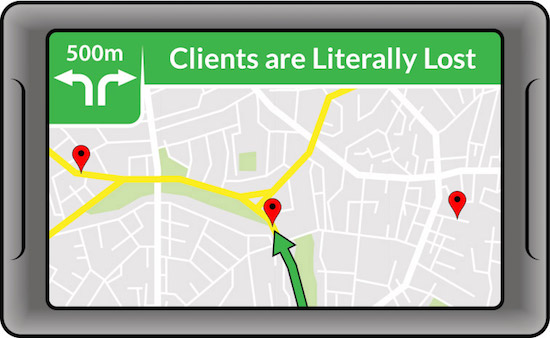Clients often ask me to review unsolicited offers they receive, usually by e-mail, that raise alarm bells about some aspect of their online presence. In this post, I will teach you how to spot bad business.
First, don’t feel bad if you’ve taken the bite on the things I'm about to point out. The whole topic of online marketing, search engine optimization (SEO), and local marketing—and the quadrillion acronyms that go along with it—is highly confusing. (You may recall my series of posts on SEO.) In this post, I will cover four common scams.
- Domain registrations
- Business location errors
- Bad website links
- Website problems
[Note: I'm using the word scam in this post kind of loosely. Some of the activities are outright scams, but most are overly expensive solutions in search of a problem. It’s bad business.]
Central Themes
These unsolicited offers, which can arrive in e-mails, phone calls, and letters, contain some recurring themes. If you spot any of them (especially if the communication contains three or more), get your guard up.
Urgency — You must take action now, or else.
Surprise — We’re telling you about something you didn’t even know was happening.
Terror — If you don’t fix this you’ll go out of business, and your pets will stop loving you.
Only Us — We are the only ones who can fix this—we’re sure of it.
Trust Us — We have expertise and we are doing you a huge favor.
Here's how four big scams work.
Domain Registrations

Perhaps the most prolific scam is with domain name renewals. When you have a domain (.com/.net/.org) name for your website, you pay an annual fee to retain ownership of it. Typically you pay a company like GoDaddy, Network Solutions, or even certain website design firms. Registration is an annual charge that usually processes automatically, so it’s very easy to forget about. Because domain ownership records are public, a few months before your domain name expires, you’ll start receiving very official-looking correspondence, most commonly from Domain Registry of America, urging you to renew, or else.
While the companies sending you the domain renewal alerts make it look like they're doing you a favor, they most certainly are not. What they are really doing is attempting to transfer the registration responsibilities away from your current company to themselves, at a higher annual fee. There is no need to do a transfer when you can simply renew your domain with your current registrar. Further, the act of transferring registration companies is somewhat technical. Lawyers who do it themselves often inadvertently take down their e-mail and website.
What you should do:
Verify Ownership: Now is a great time to make sure that your name ownership records are correct. (At my firm, we’ve set up a free tool so that you can make sure the right person, address, and e-mail are on file.) This tool will also tell you what company you’re using for registration. If there are problems, contact or log into your registrar and fix them.
Automatic Renewal: Make sure that your payment information on file with your registrar is up-to-date and that automatic renewal is turned on.
Domain Lock: You can turn on a locking feature that makes it impossible for your domain to be transferred to another registrar.
Privacy: Depending on your registrar, you can turn on privacy controls that use a proxy in the public records. You can turn this on/off at your discretion. It may reduce the influx of scam offers, but it can also make it more difficult to recover access to your account if you lose your login.
Business Location Errors

This scam revolves around whether or not your firm’s street location and contact information are accurate on business listing websites like Google Maps, Yelp, YellowPages, and 411 as well as on mobile apps like Apple Maps. This one is tricky because often there is a problem. However, companies that push e-mails and phone calls with aggressive sales pitches for their services charge way too much, do not adequately understand what a law firm needs, or make overblown claims.
"Local search results" refers to the information people see when trying to find you online, often when they already have your name in hand. Google displays this information on a map on the first page of search results. Other programs and sites like Apple Maps, Yelp, YellowPages, Bing, and Yahoo aggregate data from multiple sources. If a law firm has moved within five years, has multiple attorneys, or has changed names, often there are some inconsistencies.
The thing to figure out with location data inconsistencies is whether or not they need to be addressed. If an ampersand is missing from the firm name, that’s not a big deal. But if old addresses, phone numbers, or the names of former partners are still showing up, you need to correct the information. The last thing you want is a client searching your firm name on an iPhone and getting directed to the office you moved out of four years ago. Also, if you’re engaged in any type of online marketing, keeping this information consistent and accurate is quite important.
What you should do:
Search for your firm name and city in Google. This should result in a special search results page that features photos of your firm, a map, and contact info. Make sure the information is accurate. If it’s not, follow the instructions at Google My Business Help.
Bad Website Links

This scam claims that your website’s Google rankings are dropping because bad links are pointing to your website. When another website links to your website, Google sees that as a vote of confidence in your website—which is good for rankings. There’s a wide spectrum of link quality. For instance, a link from a state bar website will have more impact than a link from a local bar association. Sometimes people try to cheat the system and buy links to their sites from brokers. Google frowns on this and works perpetually to eliminate the impact of these link farms and brokers.
The bad link scammer claims that there are bad links pointing to your site and hurting its rankings, and that, for a fee, the links can be fixed. While it may be true that there are some bad links pointing to your site, Google is extremely careful about applying penalties because, if it weren't, businesses could buy bad links for their competitors and harm them. In my observation, when Google identifies a bad link source, it updates its algorithms to make that link simply not count towards ranking authority, so that the bad link does not help or hurt your rankings.
So the bad link scam is an attempt to fix a problem that usually isn’t having any negative impact. Worse, some companies actually create the bad links themselves and then try to swoop in as the hero to save you.
What you can do:
If you’d like to see what is linking to your site, you can use the free tool at moz.com. After entering your website's URL, click on “Linking Domains” for a list of the domain names of the websites that link to yours. Often there are some weird sites, but unless you see dozens and dozens of suspicious-looking links, there’s nothing to worry about.
Website Problems

This scam takes many forms. Companies will run an automated scanning tool over your website code to look for “errors” and then send you an extremely graphic report showing how all these “mistakes” are costing you dearly. The pitch is usually for either a service that will perpetually monitor your website or an overly expensive fix.
The problem with this scam is that the vast majority of the time the errors identified are simply stylistic differences in coding or have no meaningful bearing on website performance. Sometimes the latest or most ideal programming technique can't be used to maintain compatibility with older browsers or different web server setups. There are many ways to program a high-performing website, and continually tweaking the programming has diminishing returns. These days, search engines overwhelmingly care about content, so that’s really where extra effort should be placed when it comes to improving rankings.
I hope you’ve found the summaries of these scams and shady business practices to be informative. The Internet has been around for a while now, but in many ways it’s still like the Wild West—you’ve got to keep your wits about you.
**Originally posted on The Modern Firm’s blog.